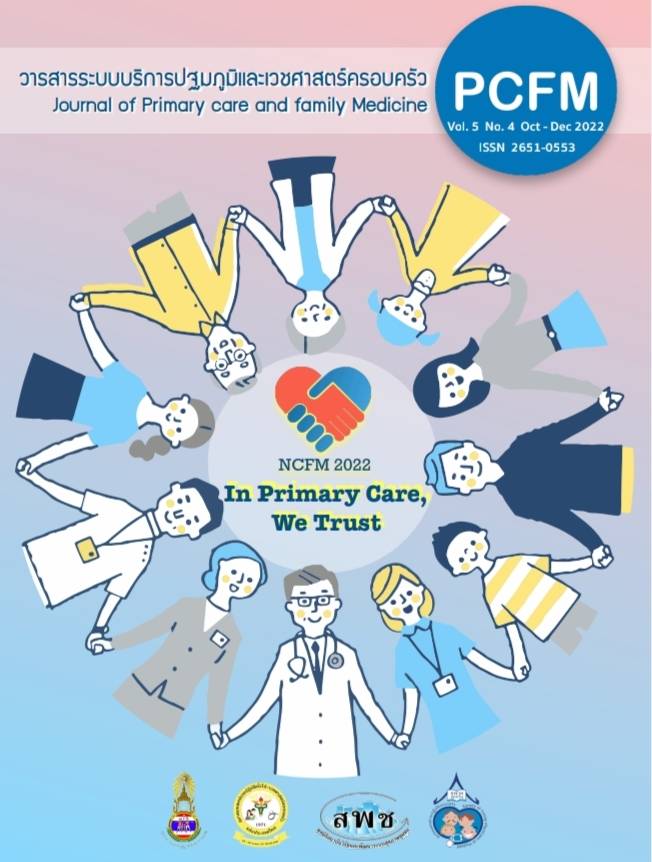ความชุกและปัจจัยที่เกี่ยวข้องกับภาวะเศร้าโศกที่เกินปกติในผู้ดูแลผู้ป่วย แบบประคับประคอง
Main Article Content
บทคัดย่อ
ที่มาและวัตถุประสงค์: เพื่อศึกษาความชุกและปัจจัยที่มีความสัมพันธ์กับการเกิดภาวะเศร้าโศกที่เกินปกติของผู้ดูแลผู้ป่วยแบบประคับประคอง
แบบวิจัย: การศึกษาภาคตัดขวาง (cross-sectional study)
วัสดุและวิธีการ: สัมภาษณ์ผู้ดููแลที่สูญเสียผู้ป่วยที่ได้รับการรักษาแบบประคับประคองทางโทรศัพท์โดยใช้แบบประเมินความเศร้าโศกจากการสูญเสียเพื่อคัดกรองภาวะเศร้าโศกที่เกินปกติ ข้อมูลแบบต่อเนื่องนำเสนอโดยใช้ค่ากลางและพิสัย ข้อมูลชนิดกลุ่มนำเสนอด้วยค่าร้อยละ การวิเคราะห์เปรียบเทียบระหว่างสองกลุ่มภาวะเศร้าโศกที่เกินปกติและปกติจากการสูญเสีย โดยการทดสอบของฟิชเชอร์และสถิติทดสอบแมน-วิทนีย์ ยู การวิเคราะห์ความสัมพันธ์ระหว่างปัจจัยต่างๆกับภาวะเศร้าโศกที่เกินปกติโดยใช้ด้วยสถิติถดถอยพหุโลจิสติกส์
ผลการศึกษา: จากการศึกษาในกลุ่มผู้ดูแลผู้ป่วยจำนวน 149 คน พบภาวะเศร้าโศกที่เกินปกติร้อยละ 24.16 ในกลุ่มที่พบภาวะเศร้าโศกที่เกินปกติพบสัดส่วนของผู้ดูแลที่ไม่ได้เตรียมใจกับการสูญเสีย(p = 0.003) มีความสัมพันธ์ระหว่างผู้ดูแลหรือผู้ป่วยที่มีต่อบุคลากรทางการ
แพทย์ระดับน้อย (p = < 0.001) หรือมีความพึงพอใจต่อระดับการดูแลจากทีมบุคลากรทางการแพทย์ระดับน้อย (p = 0.001) สูงกว่ากลุ่มที่มีภาวะเศร้าโศกปกติอย่างมีนัยสำคัญทางสถิติ จากการวิเคราะห์การถดถอยพหุโลจิสติกส์พบ ความสัมพันธ์ที่ผู้เสียชีวิตเป็นบุตร (aOR
32.74 CI 2.39-377.55, p = 0.005) และการเตรียมใจกับการสูญเสียที่ไม่ได้คาดคิด (aOR3.43 CI 1.13-10.38, p = 0.029) สัมพันธ์กับการพบภาวะเศร้าโศกที่เกินปกติที่มากขึ้นอย่างมีนัยสำคัญ
สรุป: ภาวะเศร้าโศกที่เกินปกติสามารถพบได้ในผู้ดูแลที่สูญเสียบุคคลอันเป็นที่รัก โดยมีปัจจัยที่เกี่ยวข้องคือการสูญเสียโดยไม่คาดคิด ความสัมพันธ์ที่ไม่ดีพอระหว่างผู้ดูแลหรือผู้ป่วยที่มีต่อบุคลากรทางกาแพทย์ และความไม่พึ่งพอใจต่อระดับการดูแลจากบุคลากรการแพทย์
ดังนั้นการพัฒนาในประเด็นดังกล่าว อาจลดการเกิดภาวะเศร้าโศกที่เกินปกติของผู้ดูแลได้
Article Details

อนุญาตภายใต้เงื่อนไข Creative Commons Attribution-NonCommercial-NoDerivatives 4.0 International License.
เนื้อหาและข้อมูลในบทความที่ลงตีพิมพ์ในวารสาร PCFM ถือเป็นข้อคิดเห็นและความรับผิดชอบของผู้เขียนบทความโดยตรง ซึ่งกองบรรณาธิการวารสารไม่จำเป็นต้องเห็นด้วยหรือร่วมรับผิดชอบใด ๆ
บทความ ข้อมูล เนื้อหา รูปภาพ ฯลฯ ที่ได้รับการตีพิมพ์ลงในวารสาร PCFM ถือเป็นลิขสิทธิ์ของวารสาร PCFM หากบุคคลหรือหน่วยงานใดต้องการนำทั้งหมดหรือส่วนหนึ่งส่วนใดไปเผยแพร่ต่อหรือเพื่อกระทำการใด ๆ จะต้องได้รับอนุญาตเป็นลายลักษณ์อักษรจากวารสาร PCFM ก่อนเท่านั้น
เอกสารอ้างอิง
โรจนศักดิ์ ทองคำเจริญ. การดูแลหลังการสูญเสียบุคคลอันเป็นที่รักในเวชปฏิบัติครอบครัวและปฐมภูมิ. วารสารระบบบริการปฐมภูมิและเวชศาสตร์ครอบครัว. 2561; 1(1):17-30.
สำนักงานคณะกรรมการสุขภาพแห่งชาติ. ประกาศคณะกรรมการสุขภาพแห่งชาติ พ.ศ.2563 เรื่อง นิยามปฏิบัติการ (Operational definition) ของคำที่เกี่ยวข้องกับเรื่องการดูแลแบบประคับประคอง (Palliative care) สำหรับประเทศไทย พ.ศ.2563. ราชกิจจานุเบกษา เล่มที่ 137, ตอนพิเศษ 261 ง (ลงวันที่ 6 พฤศจิกายน 2563).
Bereavement and Grief [database on the Internet]. CareSearch palliative care knowledge network 2006 [cited 10 April 2022]. Available from:https://www.caresearch.com.au/caresearch/tabid/1345/Default.aspx.
Shear MK, Simon N, Wall M, Zisook S, Neimeyer R, Duan N, et al. Complicated grief and related bereavement issues for DSM‐5. Depression and anxiety. 2011;28(2):103-17.
ศรินรัตน์ วัฒนธรนันท์. ความโศกเศร้าจากการสูญเสียบุคคลอันเป็นที่รัก: บทบาทพยาบาล. Thai Red Cross Nursing Journal. 2560; 10(1): 13-21.
Kaprio J, Koskenvuo M, Rita H. Mortality after bereavement: a prospective study of 95,647 widowed persons. American Journal of Public Health. 1987; 77(3): 283-287.
Parkes CM. Effects of Bereavement on Physical and Mental Health-a Study of the Medical Records of Widows. British Medical Journal. 1964; 2(5404): 274-279.
Stroebe M, Schut H, Stroebe W. Health outcomes of bereavement. Lancet. 2007; 370:1960–1973.
Shear MK, Ghesquiere A, Glickman K. Bereavement and Complicated Grief. Current psychiatry reports. 2013;15(11):DOI 10.1007/s11920-013-0406-z.
รัชนู วรรณา. ความชุกของอารมณ์เศร้าโศกที่ผิดปกติจากการสูญเสียและปัจจัยที่เกี่ยวข้องที่พบในผู้ป่วยนอกจิตเวช โรงพยาบาล จุฬาลงกรณ์. [วิทยานิพนธ์ปริญญาวิทยาศาสตรมหาบัณฑิต]. จุฬาลงกรณ์ มหาวิทยาลัย, 2554
Jaaniste T, Coombs S, Donnelly TJ, Kelk N, Beston D. Risk and Resilience Factors Related to Parental Bereavement Following the Death of a Child with a Life-Limiting Condition. Children. 2017; 4(11):96.
Yaiyong O, Lueboonthavatchai P. Depression and grief of the elderly at the elderly associate in Nonthaburi Province. J Psychiatr Assoc Thailand. 2011;56(2):117-28.
Prigerson HG, Bierhals AJ, Kasl SV, Reynolds CF, Shear MK, Day N, et al. Traumatic grief as a risk factor for mental and physical morbidity. American journal of psychiatry. 1997;154:616-23.
Aoyama M, Sakaguchi Y, Morita T, Ogawa A, Fujisawa D, Kizawa Y, et al. Factors associated with possible complicated grief and major depressive disorders. Psycho‐Oncology. 2018;27(3):915-21.
Coelho A, Delalibera M, Barbosa A, Lawlor P. Prolonged grief in palliative family caregivers: A pilot study in a Portuguese sample. OMEGA-Journal of Death and Dying. 2015;72(2):151-64.
Thomas K, Hudson P, Trauer T, Remedios C, Clarke D. Risk factors for developing prolonged grief during bereavement in family carers of cancer patients in palliative care: a longitudinal study. Journal of pain and symptom management. 2014;47(3):531-41.
Ringdal GI, Jordhøy MS, Ringdal K, Kaasa S. Factors affecting grief reactions in close family members to individuals who have died of cancer. Journal of Pain and Symptom Management. 2001;22(6):1016-26.
Allen JY, Haley WE, Small BJ, Schonwetter RS, McMillan SC. Bereavement among hospice caregivers of cancer patients one year following loss: predictors of grief, complicated grief, and symptoms of depression. Journal of Palliative Medicine. 2013;16(7):745-51.
Hsieh M-C, Huang M-C, Lai Y-L, Lin C-C. Grief reactions in family caregivers of advanced cancer patients in Taiwan: relationship to place of death. Cancer nursing. 2007;30(4):278-84.
Hales S, Chiu A, Husain A, Braun M, Rydall A, Gagliese L, et al. The quality of dying and death in cancer and its relationship to palliative care and place of death. Journal of pain and symptom management. 2014;48(5):839-51.
Delalibera M, Coelho A, Frade P, Barbosa A, Leal I. Caregiving and bereavement in palliative care: A cross-cultural study between Brazil and Portugal. Transcultural Psychiatry. 2020;57(3):445-54.
Coelho AM, Delalibera MA, Barbosa A. Palliative care caregivers’ grief mediators: a prospective study. American Journal of Hospice and Palliative Medicine®. 2016;33(4):346-53.
Hatano Y, Aoyama M, Morita T, Yamaguchi T, Maeda I, Kizawa Y, et al. The relationship between cancer patients' place of death and bereaved caregivers' mental health status. Psycho‐oncology. 2017;26(11):1959-64.
Guldin M-B, Vedsted P, Zachariae R, Olesen F, Jensen AB. Complicated grief and need for professional support in family caregivers of cancer patients in palliative care: a longitudinal cohort study. Supportive care in cancer. 2012;20(8):1679-85.
Tsai W-I, Prigerson HG, Li C-Y, Chou W-C, Kuo S-C, Tang ST. Longitudinal changes and predictors of prolonged grief for bereaved family caregivers over the first 2 years after the terminally ill cancer patient’s death. Palliative medicine. 2016;30(5):495-503.
Naoki Y, Matsuda Y, Maeda I, Kamino H, Kozaki Y, Tokoro A, et al. Association between family satisfaction and caregiver burden in cancer patients receiving outreach palliative care at home. Palliative & supportive care. 2018;16(3):260-8.
Trevino KM, Maciejewski PK, Epstein AS, Prigerson HG. The lasting impact of the therapeutic alliance: Patient‐oncologist alliance as a predictor of caregiver bereavement adjustment. Cancer. 2015;121(19):3534-42.
An AW, Ladwig S, Epstein RM, Prigerson HG, Duberstein PR. The impact of the caregiver-oncologist relationship on caregiver experiences of end-of-life care and bereavement outcomes. Supportive Care in Cancer. 2020;28(9):4219-25.


